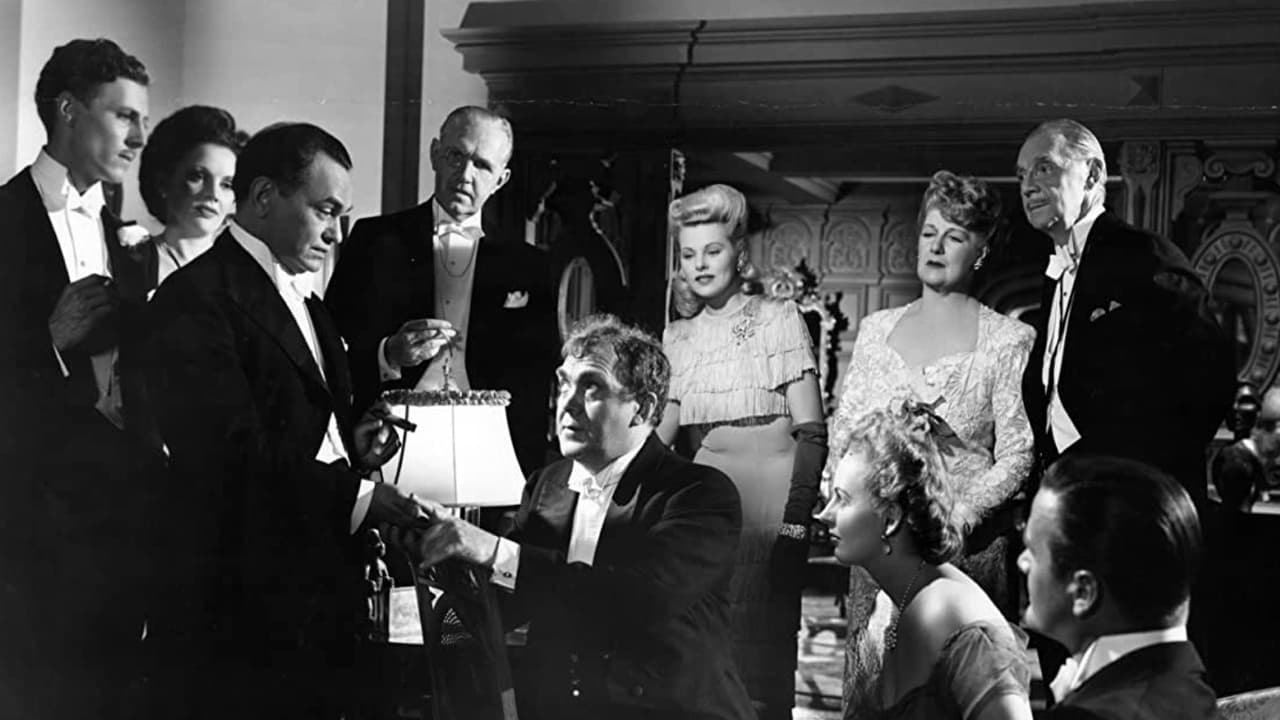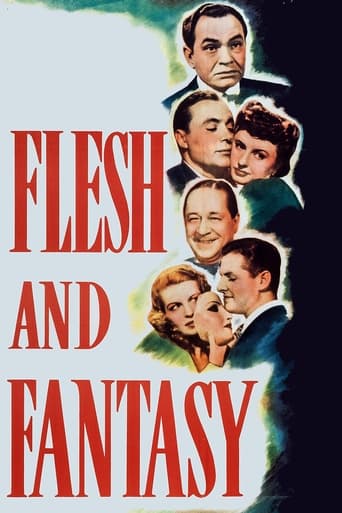

1943's "Flesh and Fantasy" is included in the Brunas-Brunas-Weaver book UNIVERSAL HORRORS, and as such gained a distinction it probably never wanted. Unusual for the studio, it's an anthology film comprised of three tales about personal responsibility and shaping one's fate, with slight supernatural overtones. Like 1945's "Dead of Night" and its Amicus offspring, we have a framing story, the delightful Robert Benchley playing off against David Hoffman (the face announcing the 'Inner Sanctum' series). Story one stars Betty Field as a plain-looking woman whose belief in her own unattractiveness has left her lonely and bitter; a chance encounter with a bearded stranger (Edgar Barrier) offers her a mask to disguise her ugliness from the man she's loved from afar, who now recognizes her beauty during an evening of Mardi Gras. This seems a bit overlong even at a mere 27 minutes, but the second story breezes by quickly, top billing Edward G. Robinson as wealthy attorney Marshall Tyler, whose belief in an eccentric palmist (Thomas Mitchell) nets him the woman of his dreams, but an ominous future in discord. Only when pressed further does the prognosticator confess that Tyler is going to kill someone; he becomes so obsessed with who his victim should be that he neglects his beautiful bride-to-be (Anna Lee) and comes to a bad end. Story three pairs Charles Boyer and Barbara Stanwyck, but its drawn out shipboard romance is a letdown coming after the best segment. What was intended to be the first tale in a four-part anthology was excised and reshaped into a 64 minute feature, 1944's "Destiny," which may have been the most dazzling of all; judge for yourself. Unbilled bits come from Peter Lawford, Marjorie Lord, Jacqueline Dalya, Doris Lloyd, Ian Wolfe, Clarence Muse, and Grace McDonald (who played a different character in "Destiny").
... View MoreJulien Duvivier was not only one of the best Directors who ever came out of France but also one of the most versatile being more than adept in several genres. Try telling that to Hollywood: Having prevailed upon him to remake his masterpiece Un Carnet de bal as Lydia they next got him to follow it with Tales Of Manhattan and then yet another episodic piece Flesh and Fantasy. To dispense with pedantry first of all; it seems that one reviewer mistakenly attributed the second segment to Noel Coward when it was, of course, the work of Oscar Wilde; in correcting the initial reviewer the person who did so claimed erroneously that both Wilde and Coward were English and gay; only 50 per cent of that statement is true; Oscar Wilde was Irish, a native of Dublin, who settled in England. Stuff like this tends to distract from the film which, in this case, is as good as one might suppose with anything to which the name Duvivier is appended. There are three basic segments linked loosely by Robert Benchley anchored in a Gentlemen's Club more than likely located in Pall Mall. The first segment reunites Robert Cummings and Betty Field who had starred the year before in a similar multi-storied adaptation King's Row; Field plays the Ugly Duckling who convinces Cummings via a little sleight-of-hand that she is a Swan. The second segment finds Edward G. Robinson initially bemused then increasingly terrified by a palmist's prediction that he will commit murder whilst the final segment sees tightrope walker Charles Boyer dreaming of falling from the high wire watched by a Barbara Stanwyck he has yet to meet. None of the segments is especially original but the combination of stylish direction and fine acting lifts it out of the rut.
... View MoreThe first story is overly sentimental and "character-rushed", with Betty Field who we are supposed to think is ugly(!), becoming beautiful after a "Twilight Zone"-like moral lesson. (I'm surprised they didn't serve us Vivien Leigh or de Havilland as the ugly woman.) The second story is the best and most original one, with a predictable ending but at least it remains interesting throughout. The blonde falling in love with Edward G. Robinson is as realistic as Betty Field being ugly.The third story: Boyer is quite sympathetic and Stanwick is good, but the story's ending isn't finite. Boyer's deliveries of lines like "I have been searching for you such a long time" and "You are the woman of my dream" are borderline funny because they epitomize the cliché of the smooth-talking Frenchman wooing a woman; Pepe Le Pew immediately came to mind (who must have been modeled after Boyer).
... View MoreA charming "anthology" motion picture, of the kind that was briefly popular in the 1940s. This one contains three stories, each of a supernatural bent. None really brilliant, but diverting.The second piece was the best. This was based on a story by Oscar Wilde (not Noel Coward, as incorrectly stated in another review). Edward G. Robinson plays a lawyer haunted by a prediction that he will murder someone, and the always-watchable Thomas Mitchell is the palm-reader.The first, with Robert Cummings and Betty Field in a story set in the Mardi Gras, is appealing in a naive way. The third segment, set in a circus, is the weakest. Charles Boyer an acrobat? No way.This movie suffers somewhat from some of the most unconvincing studio-bound "locations" I have ever seen. I know, this was the 1940s and all that, made in the middle of the war, but puh-lease!
... View More